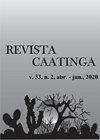Physiological performance of Tabebuia aurea seeds subjected to abiotic stresses
IF 0.9
4区 农林科学
Q3 AGRONOMY
引用次数: 0
Abstract
ABSTRACT Seeds subjected to abiotic stresses may have their physiological performance compromised, impairing the multiplication of species. Thus, the objective was to evaluate the germination and initial development of Tabebuia aurea seedlings subjected to water and salt stresses. Water stress was simulated with two osmotic agents (PEG 6000 and mannitol) at five osmotic potentials (0.0, -0.2, -0.4, -0.6 and -0.8 MPa). For salt stress, three osmotic agents (NaCl, KCl and CaCl2) were used at five concentrations (0, 6, 12, 18 and 24 dS m-1). The experiments were conducted under a completely randomized experimental design, with four replicates of 25 seeds, in a factorial scheme (osmotic agents × potentials), and the data were subjected to analysis of variance and regression. The variables analyzed were germination, first germination count, germination speed index, root and shoot length, and seedling root and shoot dry mass. The results showed that water and salt stresses reduced the germination and vigor of T. aurea seeds, with water stress being more harmful to the species, especially when induced by PEG 6000. Of the salts used, the one that most harmed the species was CaCl2, followed by NaCl and KCl.非生物胁迫下金莲种子的生理性能
种子受到非生物胁迫时,其生理性能会受到损害,从而影响物种的繁殖。因此,目的是评估在水和盐胁迫下金莲幼苗的萌发和初始发育。在5种渗透电位(0.0、-0.2、-0.4、-0.6和-0.8 MPa)下,用PEG 6000和甘露醇两种渗透剂模拟水分胁迫。在盐胁迫下,使用3种渗透剂(NaCl、KCl和CaCl2),浓度分别为0、6、12、18和24 dS m-1。试验采用完全随机试验设计,4个重复,25个种子,因子方案(渗透剂×电位),数据进行方差分析和回归分析。分析的变量包括发芽率、初发芽数、发芽速度指数、根冠长、幼苗根冠干质量。结果表明,水盐胁迫降低了金毛桃种子的萌发率和活力,其中水分胁迫对金毛桃种子的危害更大,尤其是PEG 6000对金毛桃种子的危害更大。在使用的盐中,对该物种危害最大的是CaCl2,其次是NaCl和KCl。
本文章由计算机程序翻译,如有差异,请以英文原文为准。
求助全文
约1分钟内获得全文
求助全文
来源期刊

Revista Caatinga
AGRONOMY-
CiteScore
2.10
自引率
11.10%
发文量
67
审稿时长
6-12 weeks
期刊介绍:
A Revista Caatinga é uma publicação científica que apresenta periodicidade trimestral, publicada pela Pró-Reitoria de Pesquisa e Pós-Graduação da Universidade Federal Rural do Semi-Árido – UFERSA, desde 1976.
Objetiva proporcionar à comunidade científica, publicações de alto nível nas áreas de Ciências Agrárias e Recursos Naturais, disponibilizando, integral e gratuitamente, resultados relevantes das pesquisas publicadas.
 求助内容:
求助内容: 应助结果提醒方式:
应助结果提醒方式:


